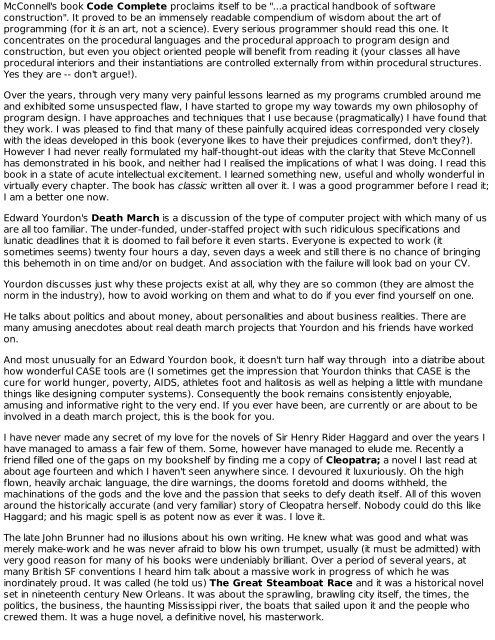Triffids Beard 2 - The Bearded Triffid
Triffids Beard 2 - The Bearded Triffid
Triffids Beard 2 - The Bearded Triffid
Create successful ePaper yourself
Turn your PDF publications into a flip-book with our unique Google optimized e-Paper software.
McConnell's book Code Complete proclaims itself to be "...a practical handbook of software<br />
construction". It proved to be an immensely readable compendium of wisdom about the art of<br />
programming (for it is an art, not a science). Every serious programmer should read this one. It<br />
concentrates on the procedural languages and the procedural approach to program design and<br />
construction, but even you object oriented people will benefit from reading it (your classes all have<br />
procedural interiors and their instantiations are controlled externally from within procedural structures.<br />
Yes they are -- don't argue!).<br />
Over the years, through very many very painful lessons learned as my programs crumbled around me<br />
and exhibited some unsuspected flaw, I have started to grope my way towards my own philosophy of<br />
program design. I have approaches and techniques that I use because (pragmatically) I have found that<br />
they work. I was pleased to find that many of these painfully acquired ideas corresponded very closely<br />
with the ideas developed in this book (everyone likes to have their prejudices confirmed, don't they?).<br />
However I had never really formulated my half-thought-out ideas with the clarity that Steve McConnell<br />
has demonstrated in his book, and neither had I realised the implications of what I was doing. I read this<br />
book in a state of acute intellectual excitement. I learned something new, useful and wholly wonderful in<br />
virtually every chapter. <strong>The</strong> book has classic written all over it. I was a good programmer before I read it;<br />
I am a better one now.<br />
Edward Yourdon's Death March is a discussion of the type of computer project with which many of us<br />
are all too familiar. <strong>The</strong> under-funded, under-staffed project with such ridiculous specifications and<br />
lunatic deadlines that it is doomed to fail before it even starts. Everyone is expected to work (it<br />
sometimes seems) twenty four hours a day, seven days a week and still there is no chance of bringing<br />
this behemoth in on time and/or on budget. And association with the failure will look bad on your CV.<br />
Yourdon discusses just why these projects exist at all, why they are so common (they are almost the<br />
norm in the industry), how to avoid working on them and what to do if you ever find yourself on one.<br />
He talks about politics and about money, about personalities and about business realities. <strong>The</strong>re are<br />
many amusing anecdotes about real death march projects that Yourdon and his friends have worked<br />
on.<br />
And most unusually for an Edward Yourdon book, it doesn't turn half way through into a diatribe about<br />
how wonderful CASE tools are (I sometimes get the impression that Yourdon thinks that CASE is the<br />
cure for world hunger, poverty, AIDS, athletes foot and halitosis as well as helping a little with mundane<br />
things like designing computer systems). Consequently the book remains consistently enjoyable,<br />
amusing and informative right to the very end. If you ever have been, are currently or are about to be<br />
involved in a death march project, this is the book for you.<br />
I have never made any secret of my love for the novels of Sir Henry Rider Haggard and over the years I<br />
have managed to amass a fair few of them. Some, however have managed to elude me. Recently a<br />
friend filled one of the gaps on my bookshelf by finding me a copy of Cleopatra; a novel I last read at<br />
about age fourteen and which I haven't seen anywhere since. I devoured it luxuriously. Oh the high<br />
flown, heavily archaic language, the dire warnings, the dooms foretold and dooms withheld, the<br />
machinations of the gods and the love and the passion that seeks to defy death itself. All of this woven<br />
around the historically accurate (and very familiar) story of Cleopatra herself. Nobody could do this like<br />
Haggard; and his magic spell is as potent now as ever it was. I love it.<br />
<strong>The</strong> late John Brunner had no illusions about his own writing. He knew what was good and what was<br />
merely make-work and he was never afraid to blow his own trumpet, usually (it must be admitted) with<br />
very good reason for many of his books were undeniably brilliant. Over a period of several years, at<br />
many British SF conventions I heard him talk about a massive work in progress of which he was<br />
inordinately proud. It was called (he told us) <strong>The</strong> Great Steamboat Race and it was a historical novel<br />
set in nineteenth century New Orleans. It was about the sprawling, brawling city itself, the times, the<br />
politics, the business, the haunting Mississippi river, the boats that sailed upon it and the people who<br />
crewed them. It was a huge novel, a definitive novel, his masterwork.


